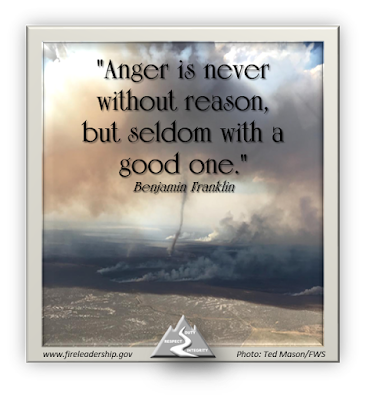"Anger is never without reason, but seldom with a good one." - Benjamin Franklin
A forum where students of fire and leadership come together to discuss, debate and exchange leadership development concepts, experience, and thoughts with an intent to promote cultural change in the workforce and strengthen the wildland fire service and the communities they serve.
Thursday, November 29, 2018
Tuesday, November 27, 2018
When Luck Runs Out
 |
| (Credit: Geralt/Pixabay) |
By Mark Smith, Mission-Centered Solutions
©Mission-Centered Solutions Version 7 FINAL (16 June 2017)
[Mark Smith has been presenting Luck Runs Out (What does a well-founded risk decision look like?) at IMT meetings, safety summits at wildfire academies, etc. Where The Big Lie was more a problem statement, Luck Runs Out is meant to focus on actionable, practical steps forward for IMTs and Agency Administrators. The above information started not as an essay but as a handout to go with presentations.]
This paper is the result of an ongoing dialog around risk I’ve had within the post-Yarnell Honor the Fallen group. One member posed the rhetorical but critical question: “Should we be risking lives for suppression efforts or not?“ That prompted my response in The Big Lie essay on the levels of risk I think wildland firefighters operate in routinely, and how we could be more intelligently accepting that risk.
Monday, November 26, 2018
IGNITE - What do you see?
It's not what you look at that matters, it's what you see. - Henry David Thoreau
Labels:
Food for Thought,
IGNITE,
Self-awareness,
Situation Awareness
Thursday, November 22, 2018
IGNITE: Grateful
Nothing is more honorable than a grateful heart. - Seneca
[Photo credit: Kyle Miller/Wyoming IHC]
Tuesday, November 20, 2018
Body Talk - What are you saying?
 (credit: Free Graphic Today/Pixabay) (credit: Free Graphic Today/Pixabay) |
Communication
(Leading in the Wildland Fire Service, p. 22)
Communication is the primary tool for establishing an effective command climate. The ability to communicate effectively is universally rated as one of the most important leadership behaviors. Communication is the foundation upon which we build trust and enable our teams to develop cohesion. Effective communication is a two-way process. Good leaders actively listen to build trust with others.
Monday, November 19, 2018
Thursday, November 15, 2018
Tuesday, November 13, 2018
Accountability or Leadership?
 |
| (Courtesy of the Wildland Fire Lessons Learned Center) |
You can hardly look around and not find someone bending or breaking a "rule." Whether it is someone running a stop sign or not wearing proper personal protective equipment (PPE), the "offender" has an excuse.
Labels:
Accountability,
Coaching,
Duty,
Leadership Environment
Monday, November 12, 2018
Thursday, November 8, 2018
IGNITE: Formation of Character
Tuesday, November 6, 2018
Are you boring or optimal?
 |
| (Credit: Geralt/Pixabay) |
In his TED Talk “3 ways to make better decisions—by thinking like a computer”
cognitive scientist Tom Griffiths gave me practical strategies for
making better decisions for future decisions of this nature:
- Explore – Try something new and learn from it.
- Exploit – Use the information you already know is pretty good.
How might you relate this the explore/exploit method to repetitive decisions on the fireline? What are the pros and cons of this method?
Leader Down - Step Up and Lead
 |
| (Photo: Geralt/Pixabay) |
You and your team are working dutifully on an incident. As part of Team Bravo lead by one of the service's greatest leaders, you and all those around know you are in good hands. Your leader is well-respected both on the line and outside fire operations. There isn't a part of duty, respect, and integrity that isn't reflected in your leader.
Today is a normal day on the line, until.... (aren't those words found all too often in our accident reports). Something happens to your great leader, putting them out of commission. The specifics behind the event are not important. Your beloved leader is incapacitated and cannot lead. What next?
The answer to this question depends on what your leader and your team did prior to the event. Is there someone able and willing to step up and lead? Has your team conducted pre-mortem exercises to ensure continuity of operations?
Leadership during crisis is not how someone wants to become a leader. The reality is many individuals become leaders because of a void in leadership. The make the decision to lead!
Continuity of operations is critical within the wildland fire service. Our leaders have a duty to ensure that those below them are prepared in the event they become incapacitated. Closely related is decentralized command through a bias for action where those under our command can make decision without approval from above—not freelancing. We are all leaders at all times!
"Hard training is the solemn duty of trainers and leaders every day." - Jacko WillinkNo team wants to train for the loss or injury of a team member, especially their leader; but we MUST.
The Authority to Lead versus the Decision to Lead
(Leading in the Wildland Fire Service, pp. 5-6)
The authority to lead is established by law. Whether this authority is based on federal, state, or local law, we are legal agents exercising authority on behalf of our organizations.
The ability to lead is a different matter; it is something that cannot be legislated. To be effective, leaders must earn the trust and respect of others. A leader’s journey is a perpetual cycle of acquiring, shaping, and honing the knowledge and skills of leadership. The leadership journey is never finished.
Once we commit to becoming leaders, our focus is no longer ourselves. Fire leaders assume the serious responsibility of putting others into harm’s way and for making decisions that profoundly affect citizens, communities, and natural resources.
Leadership is a tough choice. Leaders choose to sacrifice their own needs for those of their teams and organizations. They routinely face situations and makedecisions that others criticize and second-guess. Leaders take risks and face challenges every day.
So why do we choose to lead? We lead because leading is where we make a difference.
Fire leaders bring order to chaos, improve our people’s lives, and strengthen our organizations. Leading enables us to leave a legacy for the leaders of the future so that they can take our places well prepared for the road ahead.
These are the rewards of leadership. Their effects will be seen and felt long after our careers end.
Wildland Fire Leadership Challenge - Digging a Little Deeper
- Read The Dichotomy of Leadership by Jacko Willink and Leif Babin. Part II, Chapter 5 - "Train Hard, but Train Smart" inspired this post.
- Develop and implement a pre-mortem training plan that includes a vacancy of leadership.
About the Author: Pam McDonald is a writer/editor for BLM Wildland Fire Training and Workforce Development and member of the NWCG Leadership Subcommittee. The expressions are those of the author.
Monday, November 5, 2018
IGNITE: Self-Leadership
The first person you lead is you, and the first organ you master is your mind. - John Maxwell[Photo credit: Zephyr Fire Crew]
Thursday, November 1, 2018
IGNITE: Seeds of Commitment
Orders and commands don’t plant the seeds of commitment; leadership does. - Frances Hesselbein & Gen. Eric Shinseki, authors of BE • KNOW• DO
[Photo credit: Entiat IHC]
Subscribe to:
Comments (Atom)

![It's not what you look at that matters, it's what you see. - Henry David Thoreau [Photo credit: La Grande IHC] (Trees covered with fire retardant)](https://blogger.googleusercontent.com/img/b/R29vZ2xl/AVvXsEg_Mslp9MLUoFtj0bPTJg7Qy95diTSMeNzbRrhmiW-_xZF3dWX1odgsJlMI-wpdzggn46ZVqRhnEu0jv5a-LOZa3cp20IdBX5EiJo4BHgx-gcuOHzGhDOG7sAgZp_eJZN5iT5rAUk_BSsM/s400/Its-not-what-you-look-at-that-matters-its-what-you-see.png)

![In order to lead others, you must first have your own house in order.- Eric Skinseki & Frances Hesselbein, authors of “Be, Know, Do” [Photo credit: Kari Greer/USFS] (fire burning through pine cones)](https://blogger.googleusercontent.com/img/b/R29vZ2xl/AVvXsEh3djszHvMrGxVxRy-eDSWKjyxo4Cw0P8vfltmAPHPHGZfpnaVLi-Ud_FNT8mEyK_ft6l9Ok_wpucn716v4FYmuYyQkG7eknbQCM7S8wusQDSkE8mIdYmDc-ArSDuXP7SDY001S1YilOCI/s400/In-order-to-lead-others-you-must-first-have-your-own-house-in-order.png)



![The first person you lead is you, and the first organ you master is your mind. - John Maxwell [Photo credit: Zephyr Fire Crew] (firefighter looking out upon the horizon with tool in hand]](https://blogger.googleusercontent.com/img/b/R29vZ2xl/AVvXsEglgEYEDzVYWV7DmRl3ujkYsaBn_9ipevMDRMdU_kTOvPiTcZrqybaQwDi-rQRfq6Q2tsKEUMmYjfozilvR-meKq-A01NBp2b78pOI1PpOp5cHV-qGtnRUPWxp37PM1lU3-KOk4modhrUY/s400/The-first-person-you-lead-is-you_Maxwell.png)
![Orders and commands don’t plant the seeds of commitment; leadership does. - Frances Hesselbein & Gen. Eric Shinseki, authors of BE • KNOW• DO [Photo credit: Entiat IHC] (rainbow amidst a storm)](https://blogger.googleusercontent.com/img/b/R29vZ2xl/AVvXsEhE_8IcmBa5viqPZhY4k39Rg8SGUyvuSlXJ6SoDX1qJzT-oVOzhs9GNtu4BgC0YcOASMZfOG_FW0oxV6WQpCfZnJ1Jj6_Wo7DeZdfIfHfGo6TqCKyVOX-5sTUo_mUB54fckfQCRIIYb5mk/s400/orders-and-commands-don%25E2%2580%2599t-plant-the-seeds-of-commitment-leadership-does.png)